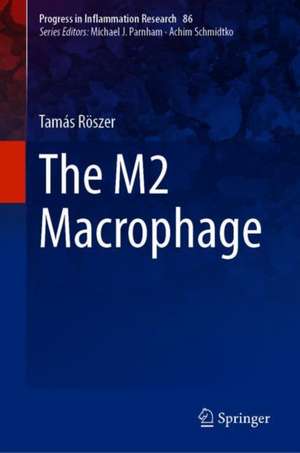The M2 Macrophage: Progress in Inflammation Research, cartea 86
Autor Tamás Röszeren Limba Engleză Hardback – 4 aug 2020
| Toate formatele și edițiile | Preț | Express |
|---|---|---|
| Paperback (1) | 658.81 lei 38-44 zile | |
| Springer International Publishing – 5 aug 2021 | 658.81 lei 38-44 zile | |
| Hardback (1) | 670.36 lei 38-44 zile | |
| Springer International Publishing – 4 aug 2020 | 670.36 lei 38-44 zile |
Din seria Progress in Inflammation Research
- 5%
 Preț: 1615.04 lei
Preț: 1615.04 lei - 5%
 Preț: 1433.10 lei
Preț: 1433.10 lei - 5%
 Preț: 723.05 lei
Preț: 723.05 lei - 18%
 Preț: 950.21 lei
Preț: 950.21 lei - 15%
 Preț: 648.42 lei
Preț: 648.42 lei - 5%
 Preț: 1300.72 lei
Preț: 1300.72 lei - 5%
 Preț: 1103.95 lei
Preț: 1103.95 lei - 5%
 Preț: 1061.93 lei
Preț: 1061.93 lei - 5%
 Preț: 715.35 lei
Preț: 715.35 lei - 5%
 Preț: 1098.63 lei
Preț: 1098.63 lei - 5%
 Preț: 657.90 lei
Preț: 657.90 lei - 5%
 Preț: 717.93 lei
Preț: 717.93 lei - 5%
 Preț: 996.71 lei
Preț: 996.71 lei - 5%
 Preț: 1413.72 lei
Preț: 1413.72 lei - 5%
 Preț: 1102.46 lei
Preț: 1102.46 lei - 5%
 Preț: 1102.82 lei
Preț: 1102.82 lei - 5%
 Preț: 991.70 lei
Preț: 991.70 lei - 5%
 Preț: 1115.86 lei
Preț: 1115.86 lei - 5%
 Preț: 720.31 lei
Preț: 720.31 lei - 5%
 Preț: 1611.76 lei
Preț: 1611.76 lei - 5%
 Preț: 654.23 lei
Preț: 654.23 lei - 5%
 Preț: 1414.64 lei
Preț: 1414.64 lei - 5%
 Preț: 652.77 lei
Preț: 652.77 lei - 5%
 Preț: 1099.94 lei
Preț: 1099.94 lei - 5%
 Preț: 1856.59 lei
Preț: 1856.59 lei - 15%
 Preț: 644.95 lei
Preț: 644.95 lei - 5%
 Preț: 1108.72 lei
Preț: 1108.72 lei - 5%
 Preț: 658.46 lei
Preț: 658.46 lei - 5%
 Preț: 1108.51 lei
Preț: 1108.51 lei - 24%
 Preț: 801.38 lei
Preț: 801.38 lei - 5%
 Preț: 715.19 lei
Preț: 715.19 lei - 5%
 Preț: 1807.08 lei
Preț: 1807.08 lei - 5%
 Preț: 721.40 lei
Preț: 721.40 lei - 5%
 Preț: 991.70 lei
Preț: 991.70 lei - 5%
 Preț: 720.68 lei
Preț: 720.68 lei - 5%
 Preț: 1100.09 lei
Preț: 1100.09 lei - 15%
 Preț: 577.87 lei
Preț: 577.87 lei - 5%
 Preț: 652.77 lei
Preț: 652.77 lei - 5%
 Preț: 653.35 lei
Preț: 653.35 lei - 5%
 Preț: 650.25 lei
Preț: 650.25 lei - 5%
 Preț: 1116.73 lei
Preț: 1116.73 lei - 5%
 Preț: 1096.98 lei
Preț: 1096.98 lei - 5%
 Preț: 1412.62 lei
Preț: 1412.62 lei - 5%
 Preț: 1420.49 lei
Preț: 1420.49 lei - 5%
 Preț: 721.77 lei
Preț: 721.77 lei - 5%
 Preț: 1102.10 lei
Preț: 1102.10 lei - 5%
 Preț: 1099.20 lei
Preț: 1099.20 lei
Preț: 670.36 lei
Preț vechi: 705.64 lei
-5% Nou
Puncte Express: 1006
Preț estimativ în valută:
128.29€ • 132.53$ • 106.77£
128.29€ • 132.53$ • 106.77£
Carte tipărită la comandă
Livrare economică 22-28 martie
Preluare comenzi: 021 569.72.76
Specificații
ISBN-13: 9783030504793
ISBN-10: 3030504794
Pagini: 224
Ilustrații: XIII, 224 p. 1 illus.
Dimensiuni: 155 x 235 mm
Ediția:1st ed. 2020
Editura: Springer International Publishing
Colecția Springer
Seria Progress in Inflammation Research
Locul publicării:Cham, Switzerland
ISBN-10: 3030504794
Pagini: 224
Ilustrații: XIII, 224 p. 1 illus.
Dimensiuni: 155 x 235 mm
Ediția:1st ed. 2020
Editura: Springer International Publishing
Colecția Springer
Seria Progress in Inflammation Research
Locul publicării:Cham, Switzerland
Cuprins
Chapter 1. Introduction. What is an M2 macrophage? Historical overview of the macrophage polarization model. The Th1/Th2 and M1/M2 paradigms, the arginine fork.- Chapter 2. Evolutionary origin of the M2 macrophage activation: invertebrates.- Chapter 3. Evolution of M2 macrophage functions in chordates.- Chapter 4. Signal mechanisms of M2 macrophage activation.- Chapter 5. Mechanisms which control the size of M2 macrophage-dominated tissue macrophage niches.- Chapter 6.Immune functions of the M2 macrophages: host defense, self-tolerance and autoimmunity.- Chapter 7. M2 macrophages in the integument and in the musculoskeletal system.- Chapter 8. M2 macrophages in the circulatory-, respiratory and excretory organs.- Chapter 9. M2 macrophages in the metabolic organs and in the neuroendocrine system.- Chapter 10. Practical approaches in M2 macrophage biology: analysis, pharmacology and didactical interpretation of M2 macrophage functions.
Notă biografică
Tamás Röszer is a Research Group Leader and Lecturer (Privatdozent) at the Institute of Neurobiology, Ulm University, Germany. His chief research interests are the endocrine control of immunity and metabolism, and macrophage biology in the context of development and physiology. He is the author of several research articles in the field of immunometabolism, diabetes and comparative molecular endocrinology, and reference books in nitric oxide biology and pathophysiology.
Textul de pe ultima copertă
Macrophages are core components of the innate immune system. Once activated, they may have either pro- or anti-inflammatory effects that include pathogen killing, safe disposal of apoptotic cells or tissue renewal. The activation state of macrophages is conceptualized by the so-called M1/M2 model of polarization. M2 macrophages are not simply antagonists of M1 macrophages; rather, they represent a network of tissue resident macrophages with roles in tissue development and organ homeostasis. M2 macrophages govern functions at the interfaces of immunity, tissue development and turnover, metabolism, and endocrine signaling. Dysfunction in M2 macrophages can ruin the healthy interplay between the immune system and metabolic processes, and lead to diseases such as insulin resistance, metabolic syndrome, and type 1 and 2 diabetes mellitus. Furthermore, M2 macrophages are essential for healthy tissue development and immunological self-tolerance. Worryingly, these functions of M2 macrophages can also be disrupted, resulting in tumor growth and autoimmunity. This book comprehensively discusses the biology of M2 macrophages, summarizes the current state of knowledge, and highlights key questions that remain unanswered.
Caracteristici
Provides a comprehensive summary of M2 macrophage functions Fills an important gap in the literature on leukocyte biology Can be used as a textbook or reference guide
